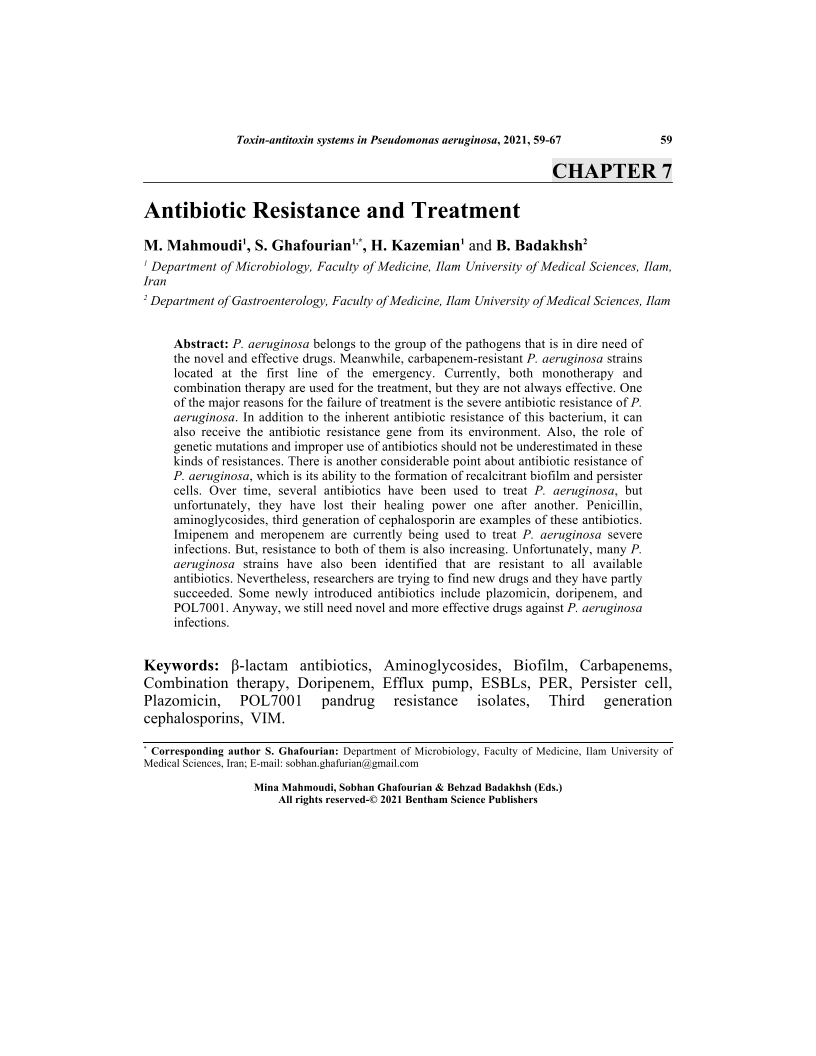Antibiotic Resistance and Treatment

- Authors: M. Mahmoudi1, S. Ghafourian2, H. Kazemian3, B. Badakhsh4
-
View Affiliations Hide Affiliations1 Department of Microbiology, Faculty of Medicine, Ilam University of Medical Sciences, Ilam, Iran 2 Department of Microbiology, Faculty of Medicine, Ilam University of Medical Sciences, Ilam, Iran 3 Department of Microbiology, Faculty of Medicine, Ilam University of Medical Sciences, Ilam, Iran 4 Department of Gastroenterology, Faculty of Medicine, Ilam University of Medical Sciences, Iran
- Source: Toxin-Antitoxin Systems in Pseudomonas aeruginosa , pp 59-67
- Publication Date: May 2021
- Language: English
Antibiotic Resistance and Treatment, Page 1 of 1
< Previous page | Next page > /docserver/preview/fulltext/9781681087931/chapter-7-1.gif
P. aeruginosa belongs to the group of the pathogens that is in dire need of the novel and effective drugs. Meanwhile, carbapenem-resistant P. aeruginosa strains located at the first line of the emergency. Currently, both monotherapy and combination therapy are used for the treatment, but they are not always effective. One of the major reasons for the failure of treatment is the severe antibiotic resistance of P. aeruginosa. In addition to the inherent antibiotic resistance of this bacterium, it can also receive the antibiotic resistance gene from its environment. Also, the role of genetic mutations and improper use of antibiotics should not be underestimated in these kinds of resistances. There is another considerable point about antibiotic resistance of P. aeruginosa, which is its ability to the formation of recalcitrant biofilm and persister cells. Over time, several antibiotics have been used to treat P. aeruginosa, but unfortunately, they have lost their healing power one after another. Penicillin, aminoglycosides, third generation of cephalosporin are examples of these antibiotics. Imipenem and meropenem are currently being used to treat P. aeruginosa severe infections. But, resistance to both of them is also increasing. Unfortunately, many P. aeruginosa strains have also been identified that are resistant to all available antibiotics. Nevertheless, researchers are trying to find new drugs and they have partly succeeded. Some newly introduced antibiotics include plazomicin, doripenem, and POL7001. Anyway, we still need novel and more effective drugs against P. aeruginosa infections.
-
From This Site
/content/books/9781681087931.chapter-7dcterms_subject,pub_keyword-contentType:Journal -contentType:Figure -contentType:Table -contentType:SupplementaryData105

